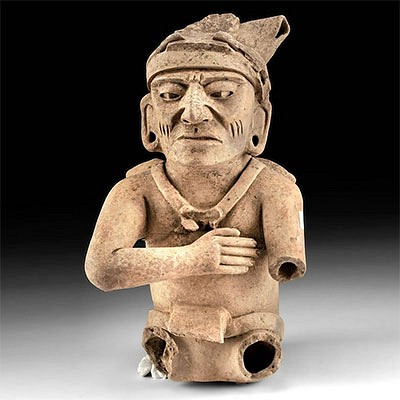18th C. Dutch / USA Glass Onion Bottles (pr)
Lot 184a
About Seller
Artemis Fine Arts
686 S Taylor Ave, Ste 106
Louisville, CO 80027
United States
Selling antiquities, ancient and ethnographic art online since 1993, Artemis Gallery specializes in Classical Antiquities (Egyptian, Greek, Roman, Near Eastern), Asian, Pre-Columbian, African / Tribal / Oceanographic art. Our extensive inventory includes pottery, stone, metal, wood, glass and textil...Read more
Categories
Estimate:
$400 - $600
Absentee vs Live bid
Two ways to bid:
- Leave a max absentee bid and the platform will bid on your behalf up to your maximum bid during the live auction.
- Bid live during the auction and your bids will be submitted real-time to the auctioneer.
Bid Increments
| Price | Bid Increment |
|---|---|
| $0 | $25 |
| $300 | $50 |
| $1,000 | $100 |
| $2,000 | $250 |
| $5,000 | $500 |
| $10,000 | $1,000 |
| $20,000 | $2,500 |
| $50,000 | $5,000 |
| $100,000 | $10,000 |
| $200,000 | $20,000 |
About Auction
By Artemis Fine Arts
Feb 3, 2022
Set Reminder
2022-02-03 10:00:00
2022-02-03 10:00:00
America/New_York
Bidsquare
Bidsquare : VARIETY SALE | Ancient, Asian, Ethnographic
https://www.bidsquare.com/auctions/artemis-gallery/variety-sale-ancient-asian-ethnographic-8833
Join us for our first sale of February with a spotlight on two fabulous collections, one from Lumberton, Texas, and the other from Whisnant Gallery in New Orleans. Artemis Fine Arts info@artemisgallery.com
Join us for our first sale of February with a spotlight on two fabulous collections, one from Lumberton, Texas, and the other from Whisnant Gallery in New Orleans. Artemis Fine Arts info@artemisgallery.com
- Lot Description
Western Europe, The Netherlands or Belgium, or United States, ca. 18th century CE. A lovely pair of mouth-blown onion glass bottles in a dark amber-green hue. These bottles have the characteristic onion or shaft and globe shape with a deeply concave base for stability and the opening mouth has a protruding collar rim for securing the cork in place with a cord. Onion bottles were used as wine or rum vessels, and made from a thick, strong glass to withstand shipping and storage, and the dark green and brown tones were from the iron oxide in the sand used to create the glass. Production of these bottles originated in Europe but were later produced in the American Colonies / United States, and the taller necked bottles date from the 18th century, a deviation from the earlier, stouter 17th century bottles. This pair is in excellent condition with pontil scars on the indented bases. Size: 5.25" Diameter x 7.5" H (13.3 cm x 19 cm)
For fans of the "Pirates of the Caribbean" films, in the first movie during the marooned island beach scene when Captain Jack reveals his secret stash of rum, he is holding a glass onion bottle - this scene is shortly before he famously asks "Why's the rum gone?"
Provenance: private Lumberton, Texas, USA collection, acquired before 2010
All items legal to buy/sell under U.S. Statute covering cultural patrimony Code 2600, CHAPTER 14, and are guaranteed to be as described or your money back.
A Certificate of Authenticity will accompany all winning bids.
b>PLEASE NOTE: Due to recent increases of shipments being seized by Australian & German customs (even for items with pre-UNESCO provenance), we will no longer ship b>PLEASE NOTE: Due to recent increases of shipments being seized by Australian & German customs (even for items with pre-UNESCO provenance), we will no longer ship firm.
Display stands not described as included/custom in the item description are for photography purposes only and will not be included with the item upon shipping.
#169594Chips to rim of larger bottle and remains of a cork or stopper loose inside the vessel. Both are otherwise intact and have pontil scars on the base.Condition
- Shipping Info
-
All shipping is handled in-house for your convenience. Your invoice from Artemis Gallery will include shipping calculation instructions. If in doubt, please inquire BEFORE bidding for estimated shipping costs for individual items.
-
- Buyer's Premium



 EUR
EUR CAD
CAD AUD
AUD GBP
GBP MXN
MXN HKD
HKD CNY
CNY MYR
MYR SEK
SEK SGD
SGD CHF
CHF THB
THB














